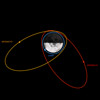2016 ARTEMIS SCIENCE NUGGETS
SUMMARIES OF ARTEMIS RESEARCH
| <<View 2015 ARTEMIS Nuggets |
 A.R. Poppe, July 2016
A.R. Poppe, July 2016LADEE/LDEX and ARTEMIS observations of lunar pickup ion variability
A combination of observations by the Lunar Atmosphere and Dust Environment Explorer (LADEE) mission and the ARTEMIS mission have revealed fundamental behavior of pickup ions generated from the Moon’s thin, neutral exosphere. Read more.
 A.R. Poppe, July 2016
A.R. Poppe, July 2016ARTEMIS observations of terrestrial molecular ions at the Moon
While crossing through the Earth's magnetotail, the twin ARTEMIS probes have detected occasional signatures of heavy, molecular ions (N2 +, NO +, and O2 +) flowing anti-Earthward. These ions, originally from the Earth’s ionosphere, escaped Earth’s gravity during a geomagnetic storm and were subsequently lost down the magnetotail. We compare these observations to global magnetohydrodynamic (MHD) models of the Earth's magnetosphere and discuss implications of this outflow for studies of the Moon’s neutral exosphere and volatile content. Read more.
 David Stansby, September 2016
David Stansby, September 2016Experimental whistler wave dispersion relation in the solar wind
The ARTEMIS spacecraft provide high frequency electric and magnetic field measurements, allowing us for the first time to construct an experimental dispersion relation for whistler waves in the solar wind. Our experimental dispersion relation agrees well with theory, and we demonstrate that the observed whistler waves cannot resonantly scatter the electron strahl population of the solar wind. Read more.
 Boyi Wang, November 2016
Boyi Wang, November 2016Investigation of triggering of poleward moving auroral forms using satellite-imager coordinated observations
Poleward Moving Auroral Forms (PMAFs), which are considered as an ionospheric signature of transient dayside reconnection and FTEs, are strongly dependent on the orientation of the interplanetary magnetic field (IMF). We present the first statistical study of Poleward Moving Auroral Forms with relation to changing IMF Bz using ARTEMIS measurements from 2008-2011. Read more.
 Please send comments/suggestions to
Emmanuel Masongsong / emasongsong@igpp.ucla.edu
Please send comments/suggestions to
Emmanuel Masongsong / emasongsong@igpp.ucla.edu